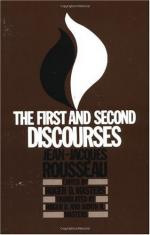
|
| Name: _________________________ | Period: ___________________ |
This test consists of 15 multiple choice questions and 5 short answer questions.
Multiple Choice Questions
1. What does Rousseau encourage the youth to look forward to?
(a) Nothing.
(b) Political power.
(c) Marriage.
(d) Mild pleasures.
2. What principle does Rousseau think is an extremely important idea in his theory of the person?
(a) Amour-propre.
(b) Language.
(c) Self preservation.
(d) Love of others.
3. What does not preserve liberty according to Rousseau?
(a) The king.
(b) The state.
(c) His theory.
(d) Alienating one's liberty.
4. What does Rousseau say of the increasing knowledge in relation to the original state of man?
(a) It nurtures it.
(b) It obscures it.
(c) It destroys it.
(d) It make it better.
5. What does Rousseau want his rulers to consider?
(a) The people's needs.
(b) Rousseau's needs.
(c) France's needs.
(d) Hobbes' ideas.
6. How do people see the weak according to Rousseau?
(a) As ignorant.
(b) In power.
(c) Enslaved.
(d) People try to not to see them.
7. What does Rousseau say of the process that makes men both wicked and sociable?
(a) It can be reverted.
(b) It occurs every day.
(c) It could have occurred in many ways.
(d) It is recent.
8. What does Rousseau have for the republic of his birth?
(a) Gratitude.
(b) Money.
(c) Little respect.
(d) High hopes.
9. How many natural principles does Rousseau say exist before reason?
(a) 3 principles.
(b) 4 principles.
(c) 8 principles.
(d) 2 principles.
10. What did the man who invented property rights found according to Rousseau in Chapter 5?
(a) Tribunals.
(b) Banks.
(c) Society.
(d) Law school.
11. What kind of place would Rousseau have loved to be born?
(a) A place where he can be the ruler.
(b) A place where he could work.
(c) France.
(d) A place where people are equal in their job.
12. What does not arise when men become dependent on one another?
(a) Inequality.
(b) Envy.
(c) Love.
(d) War.
13. What can magistrates easily usurp according to Rousseau?
(a) Power.
(b) Money.
(c) Lives.
(d) Properties.
14. Who does Rousseau say does not exhibit conditions to the same degree as modern man?
(a) Children.
(b) Savages.
(c) Women.
(d) Ancient men.
15. What is Rousseau using the dedication for?
(a) Thanks for being so generous.
(b) Thanks for the chance to think about the origin of inequality.
(c) Thanks for his riches.
(d) Thanks for his birth.
Short Answer Questions
1. What would make the state decay according to Rousseau?
2. What does Rousseau argue does not enter into consideration when a nation is formed by men?
3. What do differing forms of government result from according to Rousseau?
4. What type of democracy would Rousseau like?
5. What knowledge cannot be imputed when imagining the state of nature according to Rousseau?
|
This section contains 419 words (approx. 2 pages at 300 words per page) |

|




